Department Profile
Department Establishment:
- 1981 – 1982 – UG Courses.
PG and Research Department of Commerce:
The Standard Fireworks Rajaratnam College for Women brims with pride at the significant milestones erected along the way ever since 1968. The Department of Commerce has completed 40 years of existence proving its excellence in the field of Commerce and imprinting its mark of success in promoting educationally and socially vulnerable section of young women. The Department of Commerce continues to reap rich harvests of accolades and achievements offering good option for higher degree programs and Research Programmes:
- Two Undergraduate Programmes [B.Com. & B.Com. Computer Applications] since 1981 to provide commercial input to the students to enable them to achieve excellence in learning and research in the areas of Commerce, Social Sciences and Humanities and to understand the complexities of modern industrial society.
- Two Career Oriented Programmes to enhance career opportunities [2002-03]
- Three PG Programmmes,
-
- M.Com. [Computer Applications] to equip the students to design and develop Applications for financial transactions [2003-04]
- UGC Sponsored Innovative Programme - M.Com. [Banking Technology] to impart the required specialisation in banking and technology [2012-13]
- M.Com. [Human Resource Development] to build competence to coordinate all the employees in the workplace [2015-16]
- M.Phil. [2005-06] & Ph.D. [2010-11] Programmes to impart advanced skills to take up research based jobs and teaching jobs in commerce.
- Skill Based Programme ‘Diploma in Office Management’ approved by UGC under NSQF to cater to the needs of the job market and for the holistic development of rural women of all ages with Higher Secondary Qualification in any stream.
The PG and Research Department of Commerce is exemplarily bestowed with the very strong team of dedicated and experienced academicians. The success story of the department can be pronounced with the facts that our Department, being the forerunner in the college has produced 24Doctorates, and was granted funds by the University Grants Commission for Post-Graduation in Banking Technology, Two Career Oriented Programmes under the Scheme of Innovative Programmes and Major & Minor Research Projects by the faculty.
The Quote ‘Putting Theory into Practice’ has been aptly applied by our Department by initiating students to undergo Internship Training and undertake Projects by signing MoUs with Banks, Industries and Sivakasi Branch of SIRC of The Institute of Chartered Accountants of India for the diverse programmes being offered. The students are given ample opportunities to access to experiential learning, including practicums, field experiences, and service learning opportunities. To enrich their knowledge Seminars/Workshops, Guest Lectures and career counselling programmes are organized at frequent intervals. Annually our department release Magazine COMBEAT to write on their topics of interest and to disseminate concepts of commerce and management by encouraging unique thinking on various facts of commerce. The department also organizes the inter collegiate competition on the theme COMFEST to kindle the competitive spirit of the students and to orient them on the recent trends in macro environment. Workshops on UGC-NET/SET and other competitive examination are organized for the outgoing batches to get them prepared for the job market. The PG and Research Department of Commerce unveils the countless opportunities at local, regional, national and global scales in the business world.
Vision:
To inculcate entrepreneurial culture in the minds of younger generation.
Mission:
- To equip the students with knowledge and skills for their chosen vocation.
- To inculcate values and provide opportunities for an all-round growth.
- To nurture and exhibit leadership skills.
- B.Com(General)
- B.Com (CA)
- M.Com (Computer Applications)
- M.Com (Banking Technology)
- M.Com.(HRD)
- M.Phil Commerce
| Name of the Programme | B.Com(General) |
| Duration | 3 Years |
| Intake | 45 |
| Eligibility | 1. For admission to Under Graduate Programme in Commerce, a candidate must have passed the Higher Secondary Examination of Tamil Nadu or an examination (like the CBSE) recognized by the universities as equivalent thereto with Commerce and Accountancy as major subjects and any two of the following as allied subjects: Maths / Business Maths / Statistics / Economics / Business Economics /Computer Science / Principles of Economics / History / Advanced Tamil. 20% of the seats shall be reserved for Vocational stream of students (Practical marks are to be excluded). 2.Based on the rank list prepared for a total of 400 marks in the above subjects and subject to the norms as specified by the Government, admission will be made. 3.The upper age limit for admission to U.G. Programme will be 21 (twenty-one) years as on 1st July of the year of admission. However, a relaxation of 5 years is permitted for differently abled as per G.O.Ms.No.239, S.W. dated 3-9-93. SC/ST/BC/MBC/DNC candidates and women candidates may be allowed the age relaxation of 3 years beyond 21 years for the admission into UG programme. |
| Name of the Programme | B.Com (CA) |
| Duration | 3 Years |
| Intake | 35 |
| Eligibility | 1. For admission to B.Com. (Computer Applications), a candidate must have passed the Higher Secondary Examination of Tamil Nadu or an examination (like the CBSE) recognized by the universities as equivalent thereto with Commerce and Accountancy as major subjects and any two of the following as allied subjects: Maths / Business Maths / Statistics / Economics / Business Economics / Computer Science / Principles of Economics / History / Advanced Tamil. 20% of the seats shall be reserved for Vocational stream of students (Practical marks are to be excluded). 2. Based on the rank list prepared for a total of 400 marks in the above subjects and subject to the norms as specified by the Government, admission will be made. 3. The upper age limit for admission to U.G. Programme will be 21 (twenty-one) years as on 1st July of the year of admission. However, a relaxation of 5 years is permitted for differently abled as per G.O.Ms.No.239, S.W. dated 3-9-93. SC/ST/BC/MBC/DNC candidates and women candidates may be allowed the age relaxation of 3 years beyond 21 years for the admission into UG programme. |
| Name of the Programme | M.Com (Computer Applications) |
| Duration | 2 Years |
| Intake | 41 |
| Eligibility | Admission to M.Com–Computer Applications Programme is open to candidates with a Bachelor Degree in Commerce, Management, Corporate Secretaryship, B.Com. with Computer Applications / E-Commerce/Professional Accounting / Banking and Insurance / Corporate Secretatryship and Bachelor of Computer Applications of Madurai Kamaraj University or any other institutions / Examination accepted as equivalent by the Syndicate of Madurai Kamaraj University. |
| Name of the Programme | M.Com (Banking Technology) |
| Duration | 2 Years |
| Intake | 41 |
| Eligibility | Admission to M.Com - Banking Technology Programme is open to candidates with a Bachelor Degree in Commerce, Management, Corporate Secretaryship, B.Com. with Computer Applications / E-Commerce/Professional Accounting / Banking and Insurance / Corporate Secretaryship and Bachelor of Computer Applications of Madurai Kamaraj University or any other institutions / Examination accepted as equivalent by the Syndicate of Madurai Kamaraj University. |
| Name of the Programme | M.Com.(HRD) |
| Duration | 2 Years |
| Intake | 41 |
| Eligibility | Admission to M.Com.(HRD) course is open to candidates with a Bachelor Degree in Commerce, Management, Corporate Secretaryship, B.Com.(CA) and BCA of Madurai Kamaraj University or any other institutions/Examination accepted as equivalent thereto by the Syndicate subject to such other conditions as may be prescribed thereof. |
| Name of the Programme | M.Phil Commerce |
| Duration | 1 Year |
| Intake | 2 |
| Eligibility | The minimum qualification for admission to this programme will be a Post Graduate Degree in Commerce with 60% of marks. A qualifying certificate in the Entrance Examination conducted by Madurai Kamaraj University, Madurai is required. A pass in the Viva voce conducted by the Research Centre, as per Madurai Kamaraj University Regulations, 2016 will fulfill the eligibility condition for the admission in M.Phil. |
PLOs -PSOs- PEOs
B.COM(General)
SYLLABUS 2023
Programme Learning Outcomes (PLOs):
Programme Learning Outcomes are narrower statements that describe what students are expected to know and be able to do upon the graduation. These relate to the skills, knowledge and behaviour that students acquire in their study through the programmes.
PLO1: Disciplinary knowledge
Apply the knowledge of Arts, Science and Humanities to address fundamental and complex questions appropriate to their programmes.
PLO2: Critical thinking, Problem solving and Analytical reasoning
Make use of appropriate knowledge and skills to identify, formulate, analyze and solve problems in order to reach substantiated conclusions.
PLO3: Research related skills and scientific reasoning
Critically analyze research processes, products and practices with a view of strategic use of data in their field.
PLO4: Communication skills and Digital literacy
Demonstrate skills in oral and written communication and make use of ICT in various learning ambience.
PLO5: Team work and Leadership quality
Interact productively with people from diverse backgrounds as both leaders/mentors and team members with integrity and professionalism.
PLO6: Multicultural competence with Moral and ethical awareness
Defend the society against gender and environmental issues with moral and ethical awareness.
PLO7: Self-directed and Life-long learning
Formulate their own educational needs in a changing world in ways sufficient to maintain their competence and to allow them to contribute to the advancement of knowledge.
Programme Specific Outcomes (PSOs):
Programme Specific Outcomes denote what the students should be able to do in their discipline at the time of graduation. They are programme specific. The PSOs should be mapped to all the specified PEOs.
By the completion of the B.Com. programme, the learners will be able to
PSO1: apply quantitative and qualitative knowledge on recent trends in Commerce, Management, Finance and Banking to attain the social and economic goals.
PSO2: integrate knowledge, skill and reasoning ability to reach out appropriate conclusions for problems in day-to-day business affairs with self-directed desire for continuous learning.
PSO3: venture into Entrepreneurship, Managerial positions, Accounting areas, Banking Sectors, Auditing Avenues, Company Secretaryship, Securities Trading and Teaching as ethically and socially responsible.
Programme Educational Objectives (PEOs):
PEOs are broad statements that describe the career and professional achievements that the programme is preparing the graduates to achieve within the first few years after graduation. PEOs should be consistent with the mission of the Institution.
The Graduates will be prepared to
PEO1: undertake post-graduation in commerce, finance, management and social works, cope up with the latest developments in commerce streams at national and global level and take up job opportunities as administrators, accountants and cashier.
PEO2: be competent in quantitative reasoning and critical thinking to appear for competitive examinations and job interviews and pursue research in commerce with sense of civic responsibility, moral accountability and professional ethics.
PEO3: possess entrepreneurial and managerial skills to become a women entrepreneur of micro to large scale industries.
B.COM. (COMPUTER APPLICATIONS)
Programme Learning Outcomes (PLOs):
Programme Learning Outcomes are narrower statements that describe what students are expected to know and be able to do upon the graduation. These relate to the skills, knowledge and behaviour that students acquire in their study through the programmes.
PLO1: Disciplinary knowledge
Apply the knowledge of Arts, Science and Humanities to address fundamental and complex questions appropriate to their programmes.
PLO2: Critical thinking, Problem solving and Analytical reasoning
Make use of appropriate knowledge and skills to identify, formulate, analyze and solve problems in order to reach substantiated conclusions.
PLO3: Research related skills and scientific reasoning
Critically analyze research processes, products and practices with a view of strategic use of data in their field.
PLO4: Communication skills and Digital literacy
Demonstrate skills in oral and written communication and make use of ICT in various learning ambience.
PLO5: Team work and Leadership quality
Interact productively with people from diverse backgrounds as both leaders/mentors and team members with integrity and professionalism.
PLO6: Multicultural competence with Moral and ethical awareness
Defend the society against gender and environmental issues with moral and ethical awareness.
PLO7: Self-directed and Life-long learning
Formulate their own educational needs in a changing world in ways sufficient to maintain their competence and to allow them to contribute to the advancement of knowledge.
Programme Specific Outcomes (PSOs):
Programme Specific Outcomes denote what the students should be able to do in their discipline at the time of graduation. They are programme specific. The PSOs should be mapped to all the specified PEOs.
By the completion of the B.Com. (Computer Applications) programme, the learners will be able to
PSO1: Gain Conceptual Foundation in the areas of accountancy, finance, marketing, banking, management and research and Tech Skills in organizing businesses.
PSO2: Integrate wide spectrum of managerial skills and practical exposure to fulfil the requirements of business and IT industries and propose strategic decisions for businesses.
PSO3: Seek variety of career options in IT fields, Software, Banks and various business organisations being professionally and ethically responsible.
Programme Educational Objectives (PEOs):
PEOs are broad statements that describe the career and professional achievements that the programme is preparing the graduates to achieve within the first few years after graduation. PEOs should be consistent with the mission of the Institution.
The Graduates will be prepared to
PEO1: Take up higher studies and placement with professional standards.
PEO2: Pursue research / Innovate for real time solutions with ethics.
PEO3: Build Capacity for Entrepreneurship and self-employment.
M.COM. (COMPUTER APPLICATIONS)
Programme Learning Outcomes (PLOs):
Programme Learning Outcomes are narrower statements that describe what students are expected to know and be able to do upon the graduation. These relate to the skills, knowledge and behaviour that students acquire in their study through the programmes.
PLO1: Disciplinary knowledge
Apply the knowledge of Arts, Science and Humanities to address fundamental and complex questions appropriate to their programmes.
PLO2: Critical thinking, Problem solving and Analytical reasoning
Make use of appropriate knowledge and skills to identify, formulate, analyze and solve problems in order to reach substantiated conclusions.
PLO3: Research related skills and scientific reasoning
Critically analyze research processes, products and practices with a view of strategic use of data in their field.
PLO4: Communication skills and Digital literacy
Demonstrate skills in oral and written communication and make use of ICT in various learning ambience.
PLO5: Team work and Leadership quality
Interact productively with people from diverse backgrounds as both leaders/mentors and team members with integrity and professionalism.
PLO6: Multicultural competence with Moral and ethical awareness
Defend the society against gender and environmental issues with moral and ethical awareness.
PLO7: Self-directed and Life-long learning
Formulate their own educational needs in a changing world in ways sufficient to maintain their competence and to allow them to contribute to the advancement of knowledge.
Programme Specific Outcomes (PSOs):
Programme Specific Outcomes denote what the students should be able to do in their discipline at the time of graduation. They are programme specific. The PSOs should be mapped to all the specified PEOs.
By the completion of the M.Com. (Computer Applications) programme, the learners will be able to
PSO1 : exhibit entrepreneurial ability by enhancing critical thinking, problem solving, decision making and leadership skills that will facilitate startups and high potential organisations.
PSO2 : facilitate production of employable, ethical and innovative professionals to sustain in the dynamic business world.
PSO3 : acquire research knowledge and applied skills in the field of commerce with computer applications.
Programme Educational Objectives (PEOs):
PEOs are broad statements that describe the career and professional achievements that the programme is preparing the graduates to achieve within the first few years after graduation. PEOs should be consistent with the mission of the Institution.
The Graduates will be prepared to
PEO1: become competent to pursue careers in the fast-growing Commerce and IT sectors through contemporary and up to date knowledge with professional ethics.
PEO2: establish themselves as effective and ethical professionals by solving real time problems through the use of Commerce and Computer knowledge.
PEO3: explore self-employment opportunities by applying professional and entrepreneurial skills.
M.COM. (BANKING TECHNOLOGY)
Programme Learning Outcomes (PLOs):
Programme Learning Outcomes are narrower statements that describe what students are expected to know and be able to do upon the graduation. These relate to the skills, knowledge and behaviour that students acquire in their study through the programmes.
PLO1: Disciplinary knowledge
Apply the knowledge of Arts, Science and Humanities to address fundamental and complex questions appropriate to their programmes.
PLO2: Critical thinking, Problem solving and Analytical reasoning
Make use of appropriate knowledge and skills to identify, formulate, analyze and solve problems in order to reach substantiated conclusions.
PLO3: Research related skills and scientific reasoning
Critically analyze research processes, products and practices with a view of strategic use of data in their field.
PLO4: Communication skills and Digital literacy
Demonstrate skills in oral and written communication and make use of ICT in various learning ambience.
PLO5: Team work and Leadership quality
Interact productively with people from diverse backgrounds as both leaders/mentors and team members with integrity and professionalism.
PLO6: Multicultural competence with Moral and ethical awareness
Defend the society against gender and environmental issues with moral and ethical awareness.
PLO7: Self-directed and Life-long learning
Formulate their own educational needs in a changing world in ways sufficient to maintain their competence and to allow them to contribute to the advancement of knowledge.
Programme Specific Outcomes (PSOs):
Programme Specific Outcomes denote what the students should be able to do in their discipline at the time of graduation. They are programme specific. The PSOs should be mapped to all the specified PEOs.
By the completion of the M.Com. (Banking Technology) programme, the learners will be able to
PSO1: gain an absolute insight into concepts, methods, resources and modern technologies in the core areas of commerce and banking technologies and take up the role as a banker and executive in Banking and Non-Banking financial institutions.
PSO2: apply the analytical skills, competencies and practical experience in strategic decision making in routine and special activities, organizational growth and digitalization of the institution engaged.
PSO3: develop an integrated financial system with ethics and a sense of social commitment for the betterment of society.
Programme Educational Objectives (PEOs):
PEOs are broad statements that describe the career and professional achievements that the programme is preparing the graduates to achieve within the first few years after graduation. PEOs should be consistent with the mission of the Institution.
The Graduates will be prepared to
PEO1: pursue research in Banking and Finance and equip themselves to take responsibilities in the arenas of Banking and finance sector with professional standards.
PEO2: establish themselves as effective and ethical banking professionals by solving real problems by integrating concepts from various disciplines (Commerce, Management and Information Technology).
PEO3: apply the Qualitative and Quantitative Reasoning ability to crack Banking Recruitment exams being conducted by public and private sector banks and explore self-employment opportunities as financial and tax consultants.
M.COM. (HUMAN RESOURCE DEVELOPMENT)
Programme Learning Outcomes (PLOs):
Programme Learning Outcomes are narrower statements that describe what students are expected to know and be able to do upon the graduation. These relate to the skills, knowledge and behaviour that students acquire in their study through the programmes.
PLO1: Disciplinary knowledge
Apply the knowledge of Arts, Science and Humanities to address fundamental and complex questions appropriate to their programmes.
PLO2: Critical thinking, Problem solving and Analytical reasoning
Make use of appropriate knowledge and skills to identify, formulate, analyze and solve problems in order to reach substantiated conclusions.
PLO3: Research related skills and scientific reasoning
Critically analyze research processes, products and practices with a view of strategic use of data in their field.
PLO4: Communication skills and Digital literacy
Demonstrate skills in oral and written communication and make use of ICT in various learning ambience.
PLO5: Team work and Leadership quality
Interact productively with people from diverse backgrounds as both leaders/mentors and team members with integrity and professionalism.
PLO6: Multicultural competence with Moral and ethical awareness
Defend the society against gender and environmental issues with moral and ethical awareness.
PLO7: Self-directed and Life-long learning
Formulate their own educational needs in a changing world in ways sufficient to maintain their competence and to allow them to contribute to the advancement of knowledge.
Programme Specific Outcomes (PSOs):
Programme Specific Outcomes denote what the students should be able to do in their discipline at the time of graduation. They are programme specific. The PSOs should be mapped to all the specified PEOs.
By the completion of M. Com. (Human Resource Development) Programme, the learners will be able to
PSO1: Gain conceptual and applied knowledge in Commerce and HR management and take up career as accountant, consultant, banker, teacher, analyst, manager, HR Co-ordinator and Investor.
PSO2: Foster analytical and critical skills for effective data–driven decision making relating to HR in managing the workforce of various production/service oriented industries.
PSO3: Design HR plan in real-time organizational processes through systematic research so as to benefit the whole of society.
Programme Educational Objectives (PEOs):
PEOs are broad statements that describe the career and professional achievements that the programme is preparing the graduates to achieve within the first few years after graduation. PEOs should be consistent with the mission of the Institution.
The Graduates will be prepared to
PEO1: Pursue higher education in Human Resource Management, assume office as International Human Resource Associate, executive recruiter, and labour relation specialist with great quantum of professional ethics.
PEO2: Foster creativity and innovation through Institutional training and Research projects for formulating professional and ethical HR policies and Strategies.
PEO3: Excel in careers with skill and ethics in corporate and financial sectors as HR managers / Consultants/ Performance Appraisers.
Faculty Details
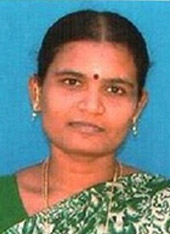
Dr. N. Rajathilagam
M.Com., M.Phil., Ph.D., SET.
Assistant Professor & Head
E-Mail rajathilagam-com@sfrcollege.edu.in Area of Specialization Marketing, Banking and Insurance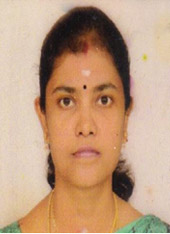
Dr. K.J. Sunmista
M.Com., M.Phil., SLET, Ph.D.,
Assistant Professor
E-Mail sunmista-com@sfrcollege.edu.in Area of Specialization Banking and Entrepreneurship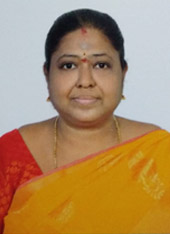
Mrs. S. Padmapriya
M.Com., M.Phil., SET, NET.Ph.D.,
Assistant Professor
E-Mail padmapriya-com@sfrcollege.edu.in Area of Specialization Financial Management and Management Accounting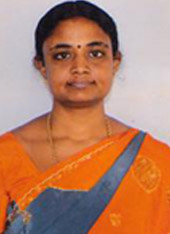
Dr. S. Grahalakshmi
M.Com., M.Phil., Ph.D., SET,
Assistant Professor
E-Mail grahalakshmi-com@sfrcollege.edu.in Area of Specialization International Finance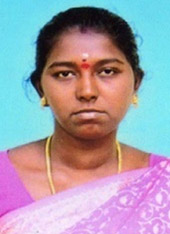
Dr.K.Sounthara Priya
M.Com., M.Phil., SET., PGDCA., Ph.D.,
Assistant Professor
E-Mail sountharapriya-com@sfrcollege.edu.in Area of Specialization MarketingRemarkable Activities
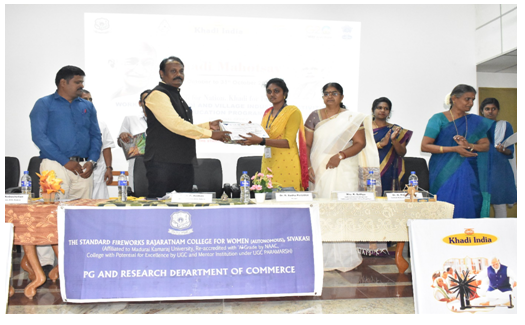
People Education Programme (PEP) (Inter-Collegiate Competition & Seminar on Rural Industrialization through MSME) on 26.10.2023 & 27.10.2023
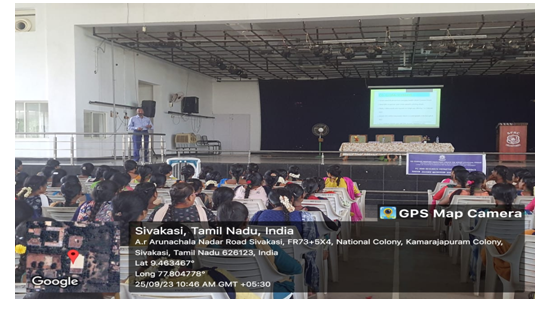
“National Seminar on Cyber Security and Cyber Crimes - Be a Cyber Warrior” on 25.09.2023
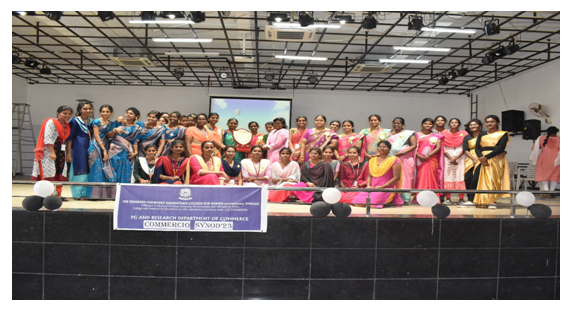
Cluster College cum Inter-Collegiate Meet COMMERCIO SYNOD ’23 on 14.3.2023
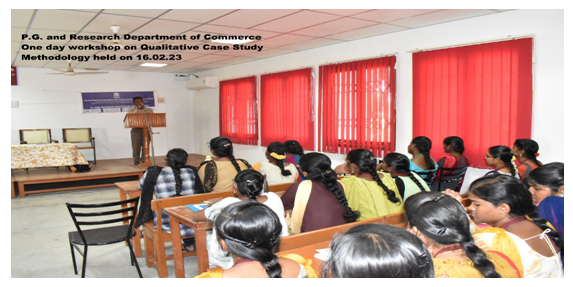
One Day Workshopon“Qualitative Case Study Methodology” on 16.2.2023
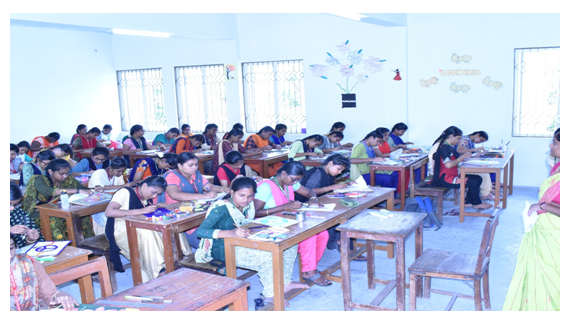
Celebration of International Peace Day 2022 - Intra Collegiate Competitions:
Poster Making, Essay Writing on 21.09.2022
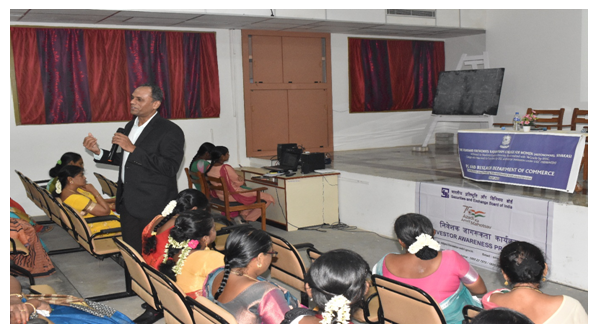
One-day workshop for Faculty on “Educated Investor is a Protected Investor” on 24.5.2022
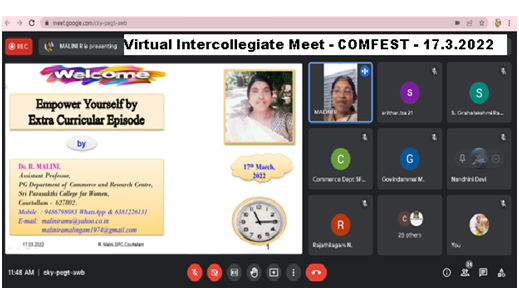
Online Inter-Collegiate Meet “COMFEST-2022” on 11.3.2022.
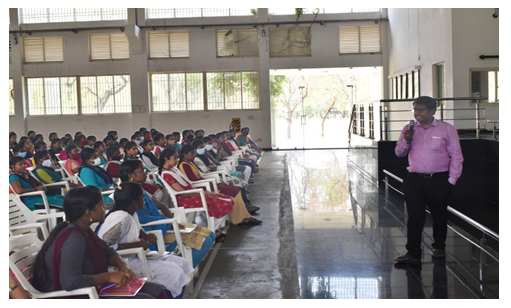
“Career Opportunities in Company Secretaryship” on 24.2.2022
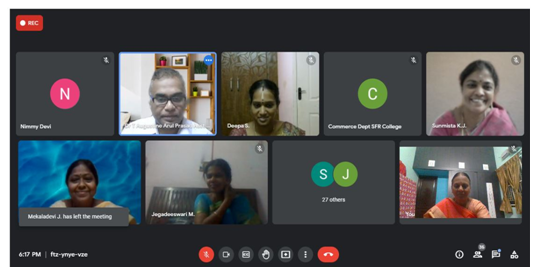
Faculty Development Webinar for the Mentee Institutions under UGC PARAMARSH on “Quality Enhancement in Higher Education - Demystifying Online Teaching – Learning Process” on 29.9.2021
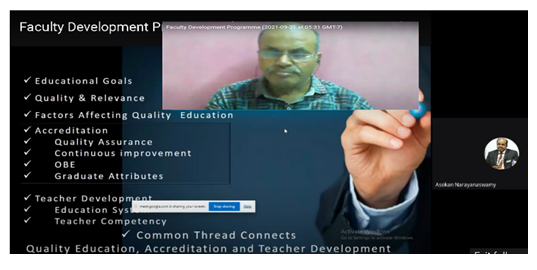
Faculty Development Webinar for the Mentee Institutions under UGC PARAMARSH on “Quality Education, Accreditation and Teacher Development” on 21.9.2021
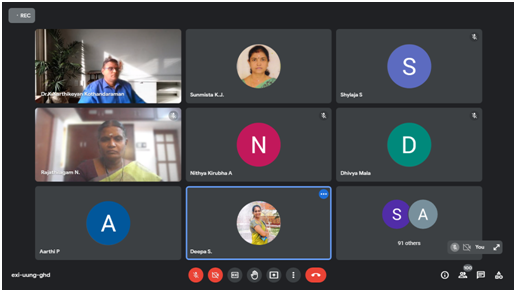
Webinar on Career Opportunities – A Road Map for Women Graduates on 14.7.2021
Activity
Research Centre in Commerce in Collaboration with The Sivakasi Branch of Southern India Regional Council of The Institute of Chartered Accountants of India organiseda Webinar on “Career Guidance for Commerce Graduates” on 17.06.2020.
Resource Person
CA S. Rathinagiri, Chartered Accountant, Sivakasi
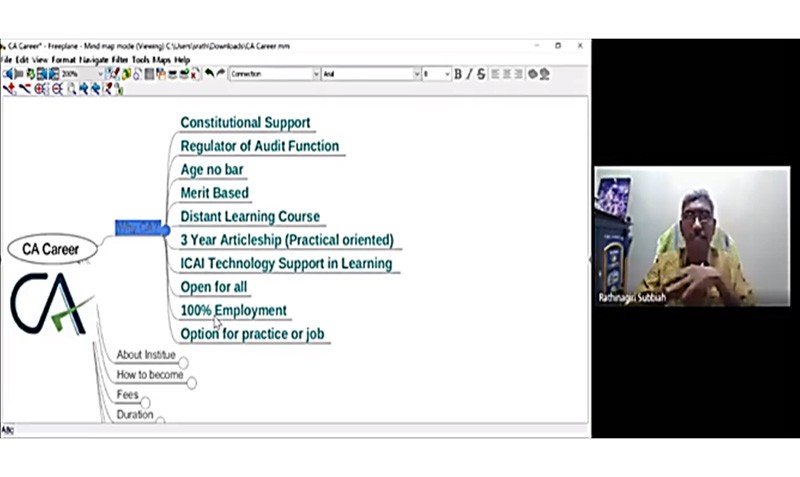
Activity
Research Centre in Commerce organised Faculty Development Programme (under UGC Autonomy Grant) on “Modern Pedagogical Methodologies in Classroom Teaching” on 27.06.2020
Resource Person
Mrs. Sindhu Krishnan, Head, Department of Insurance & Banking, Vidyalankar School of Information Technology, Mumbai.
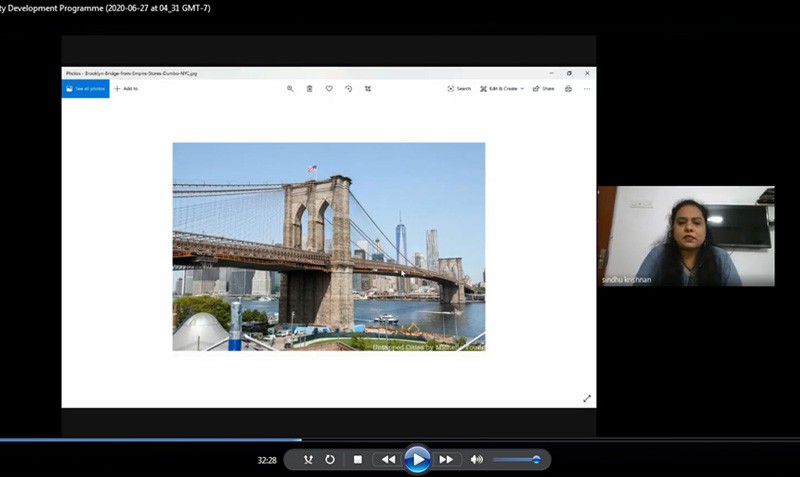
Activity
Research Centre in Commerce and Department of Commerce (C.A.) S.F. jointly organised
5 days Online Course on “Cosmetology” from 29.06.2020 – 03.07.2020.
Trainer
Mrs. Rajadivya Sasikumar, Alumnae, Makeup Artist and Hair dresser, Coimbatore.
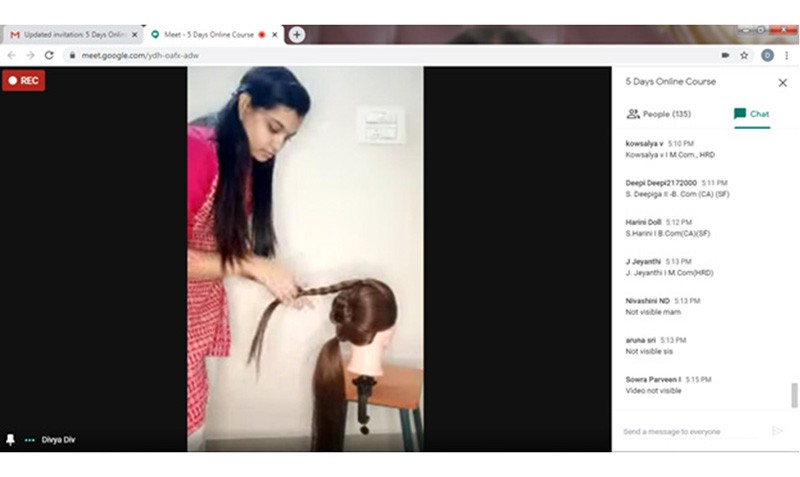
Activity
International Webinar on “Psycho-Social Resilience of the Teaching Community” held on 03.07.2020
Resource Person
Mr. B. Jeya Kumar, M.H.M., International Hospital and Health Care Management Consultant, Associated with units of ASTER DM Healthcare Private Ltd., Nigeria.
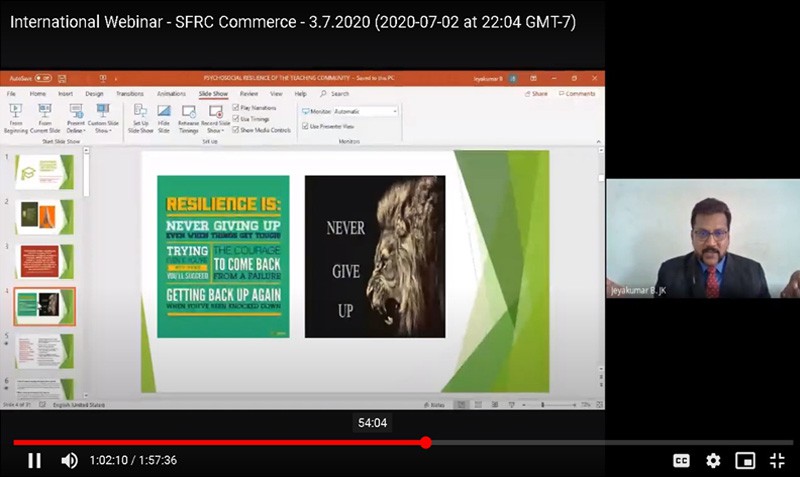
Activity
International Webinar on “How not to waste a crisis?” on 10.07.2020
Guest Speaker
Mr. Padmanabhan Subbian, B.E., M.B.A.,
Group Division Manager, YIACO Medical Company, Salmiya,
Kuwait Board Member & General Manager, Process Crafts, Dubai,
UAE General Manager, Systems.Solutions Private Limited, Singapore.
Director, Portfoliss Solutions, Bengaluru, India.
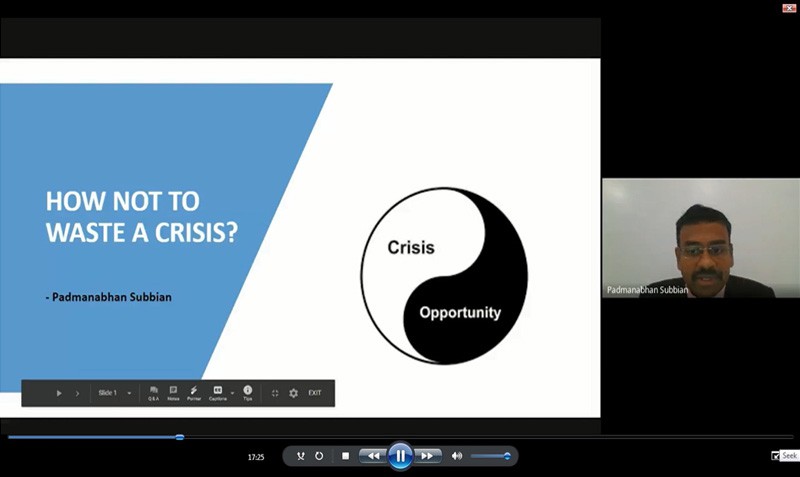
Activity
Online Faculty Development Programme (Under CPE Grant) on “Ethical Issues in Qualitative and Quantitative Research” on 18.02.2021
Resource Person
Dr. R. Kasilingam, Professor, Department of Management Studies, Pondicherry University, Pondicherry.
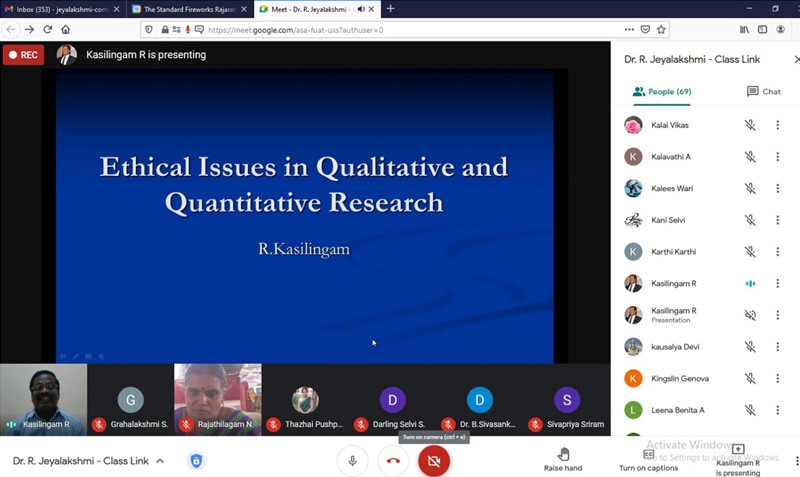
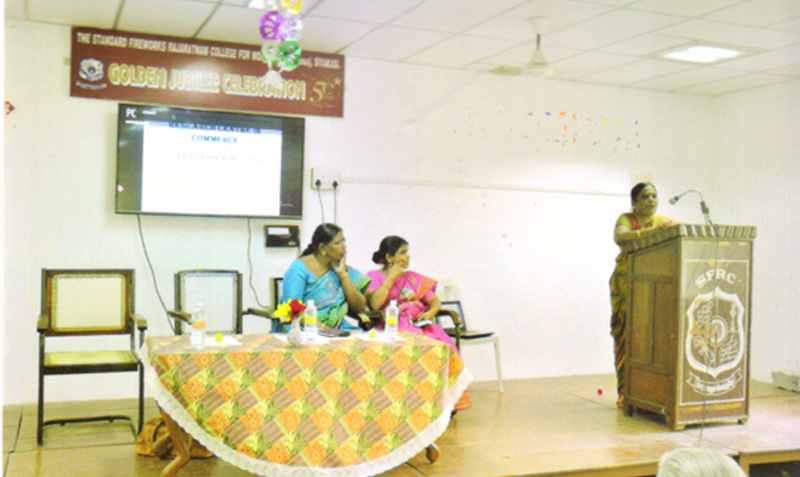
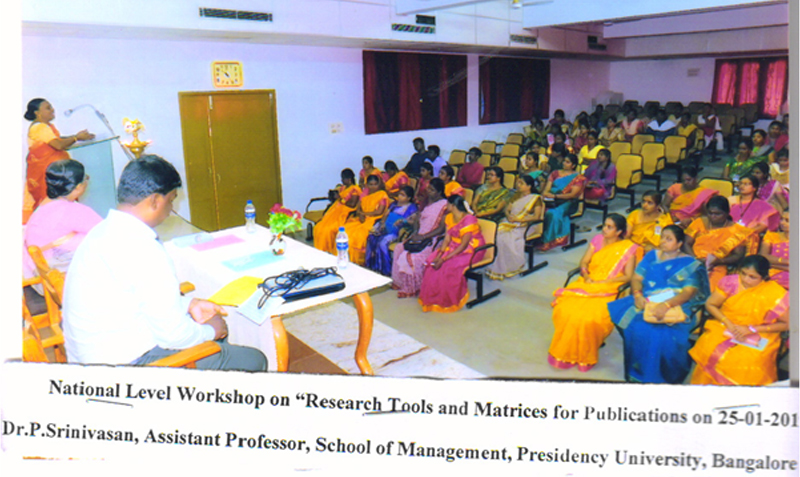
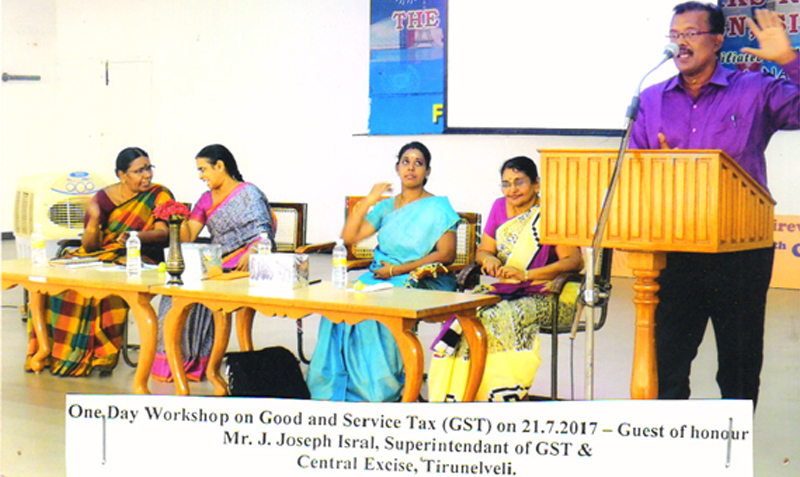
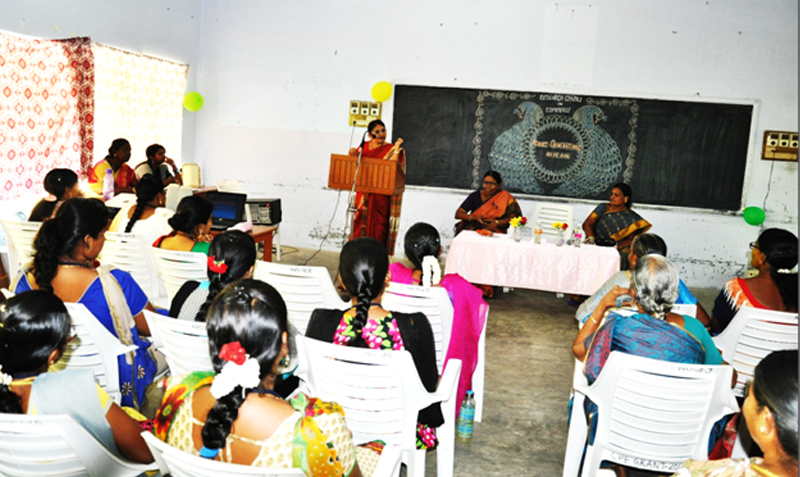
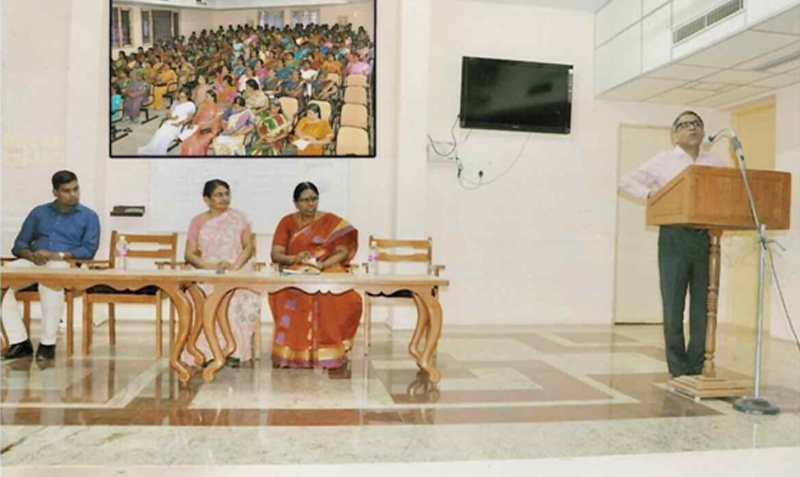
Staff Achievements
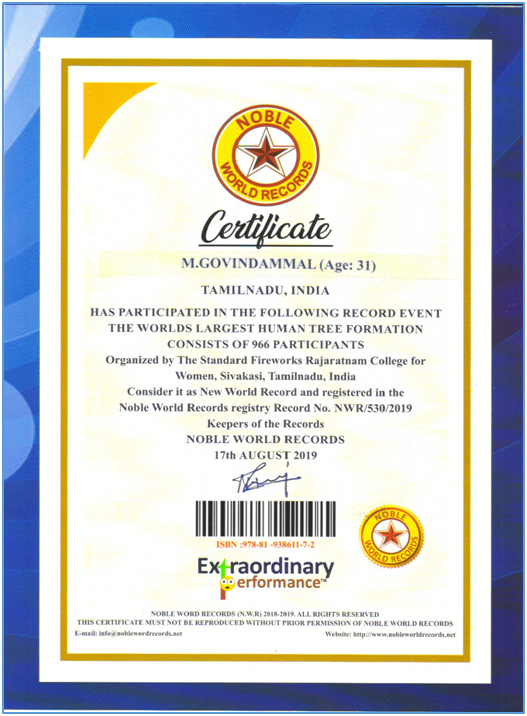
Mrs.M.Govindammal
The World Largest Human Tree Formation 2019-2020.
2019-20
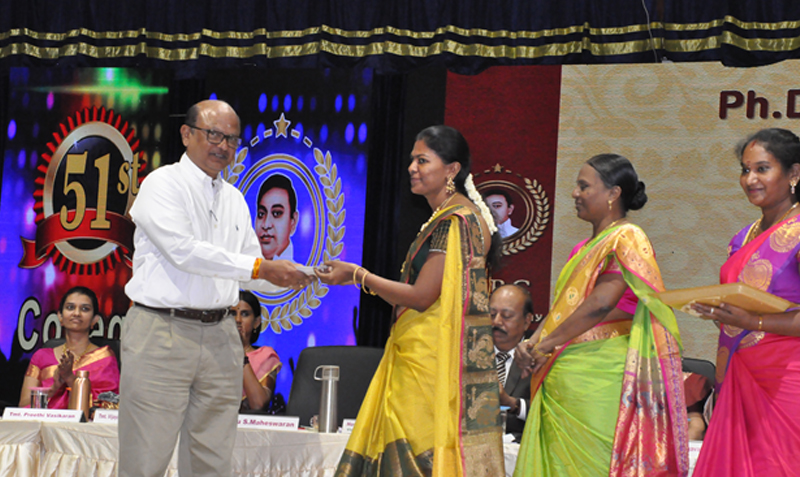
Received Felicitation from college on Annual Day - 2019-2020 for the Ph.D award, Publication in international Journal and for ELITE + SILVER + TOPPER !% in NPTEL course.
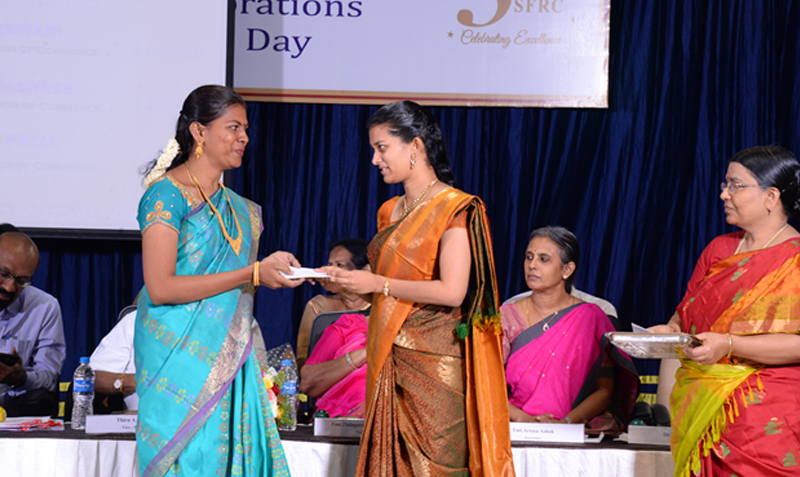
Dr. A. Vijaya Shree
Received Felicitation from college of the Annual Day 2017-18 for publication in International Journal.
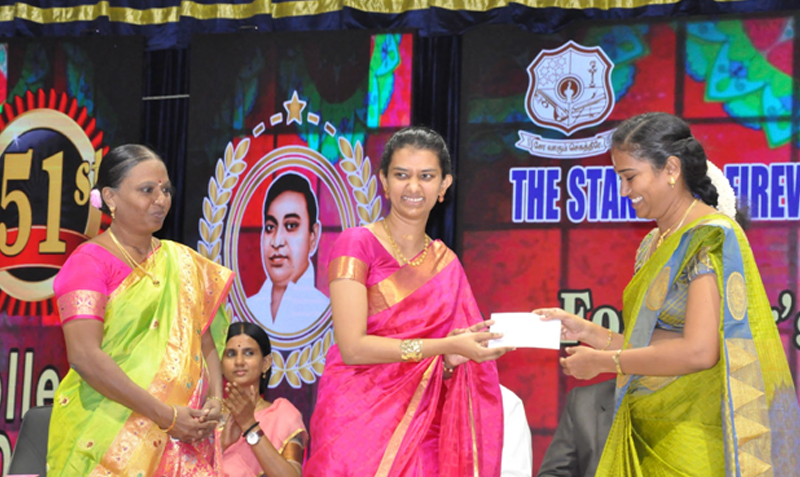
Felicitation received for the publication of research articles during the year 2020.
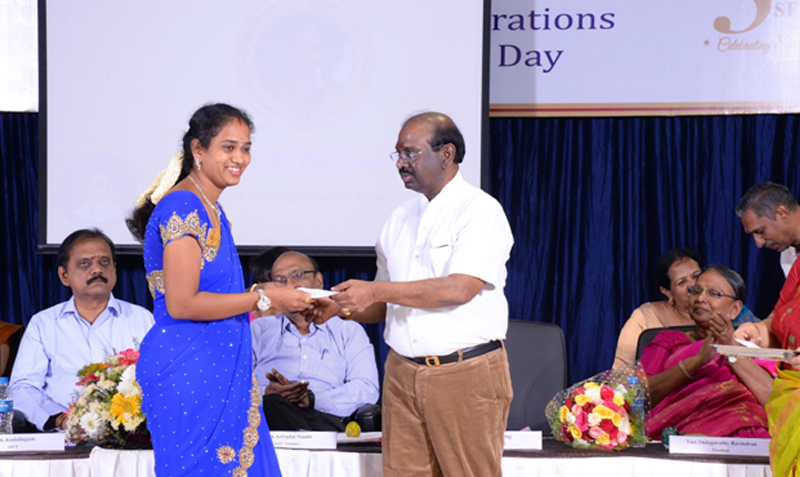
S. Deepa
Felicitation received for the award of Ph.D Degree during the year 2018.
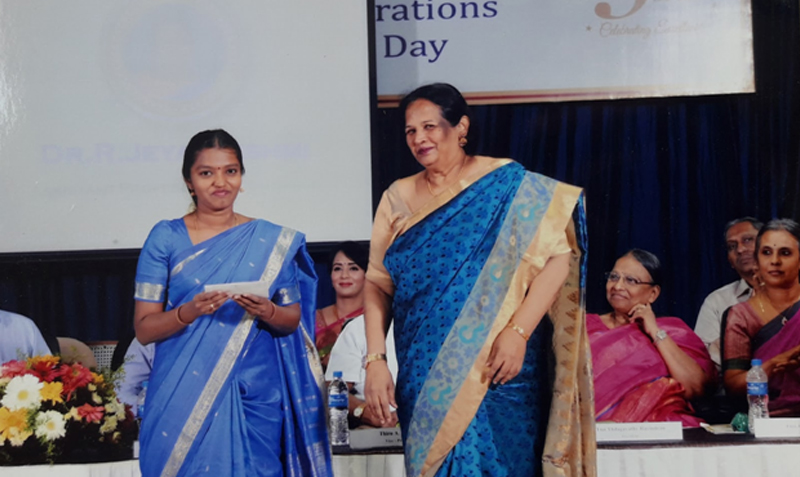
Dr. R. Jeyalakshmi
Felicitation received for completing one Minor Research Project amounted Rs. 1,55,000/- funded by University Grants Commission, Hyderabad during the year 2019.
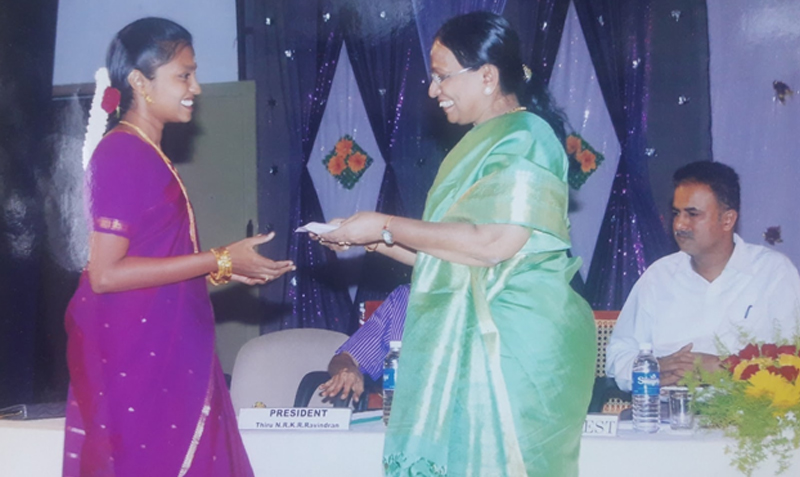
Dr. R. Jeyalakshmi
Felicitation for 100% attendance to the College during the years 2009, 2016 and 2018.
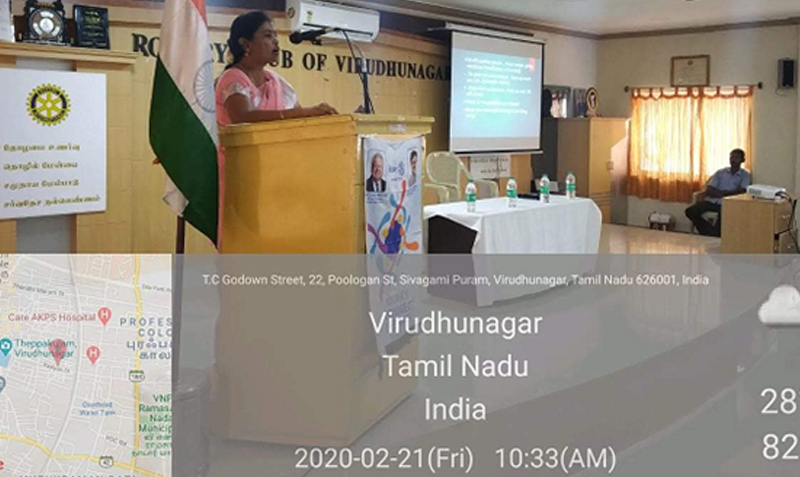
Dr.K.J.Sunmista, Trained 100 employees of Idhayam Group of Companies, Virudhunagar on Stress Management and generated a revenue of Rs.3000 during 2019-2020.
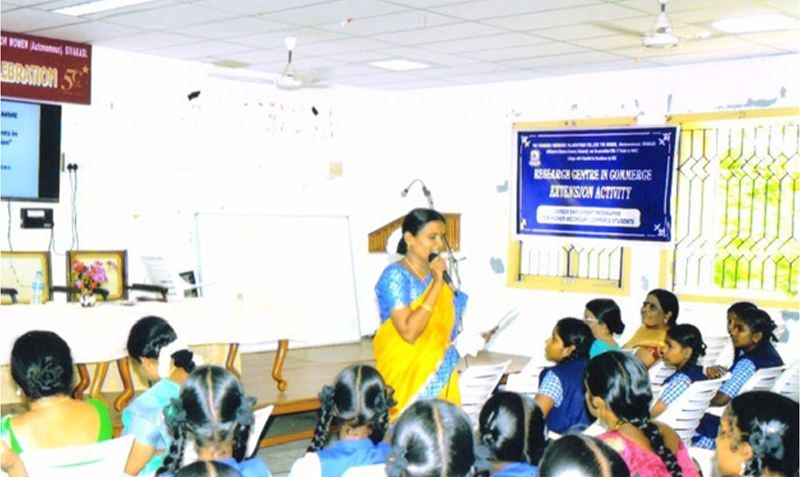
Outreach Programme on “Recent Advancement in Commerce Education”
Dr. N. Rajathilagam, Assistant Professor of Commerce, SFRC
Topic: Avenues for Higher Education in Commerce
Participant - +2 school students.
Date: 07.07.2018
Venue : Technolab at SFRC Campus
Student Achievements
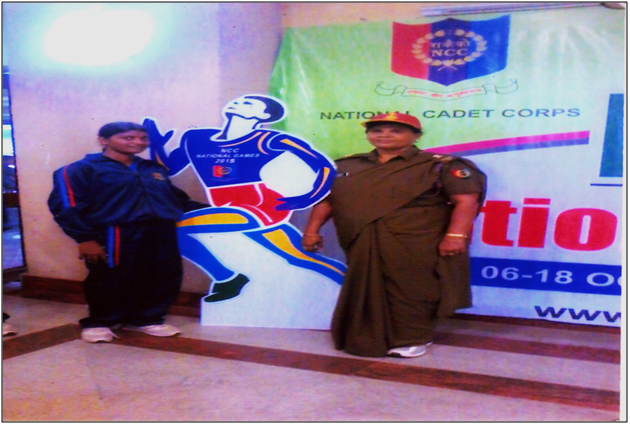
NATIONAL SPORTS CAMP ATTENDED
P.Panchavarnam II B.com ( R) attended National Sports camp at Delhi 6.10.15-18.10.15
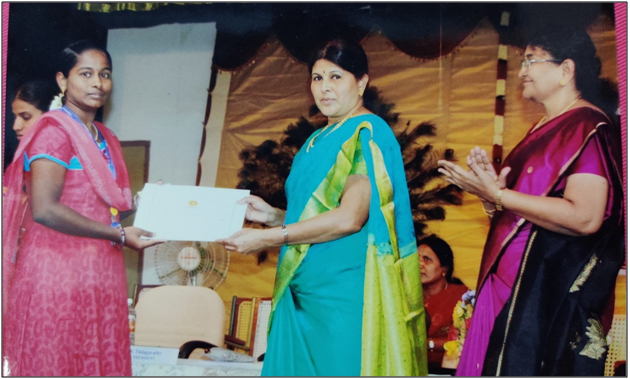
.
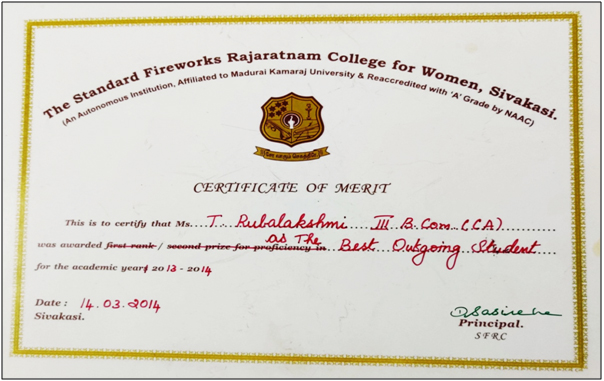
.
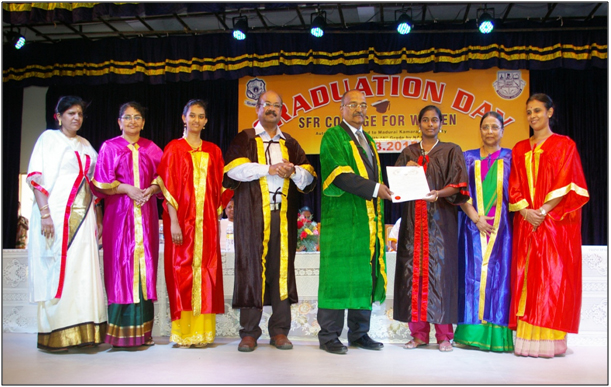
BEST OUTGOING STUDENT AWARD (2015-16)
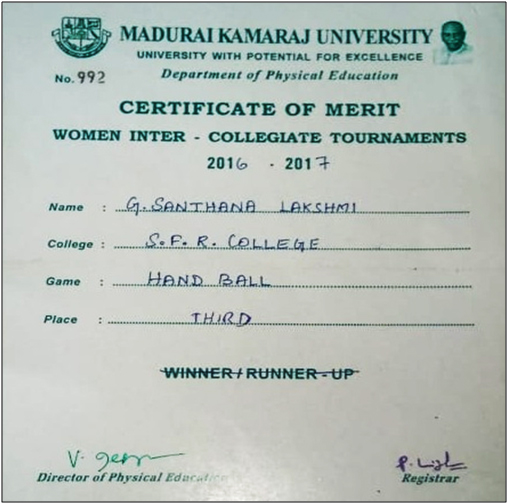
WOMEN INTER - COLLEGIATE TOURNAMENT – III PLACE
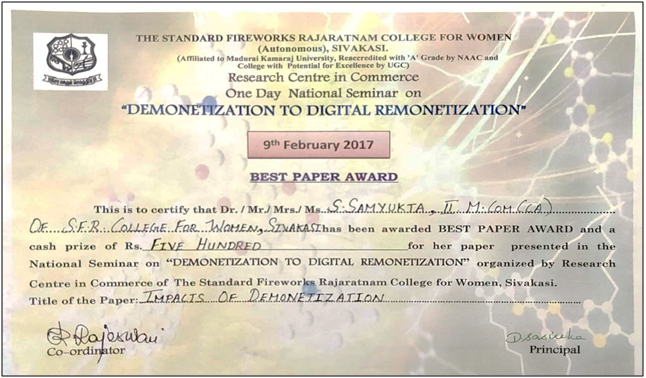
BEST PAPER AWARD – RECEIVED CASH PRIZE OF Rs . 500
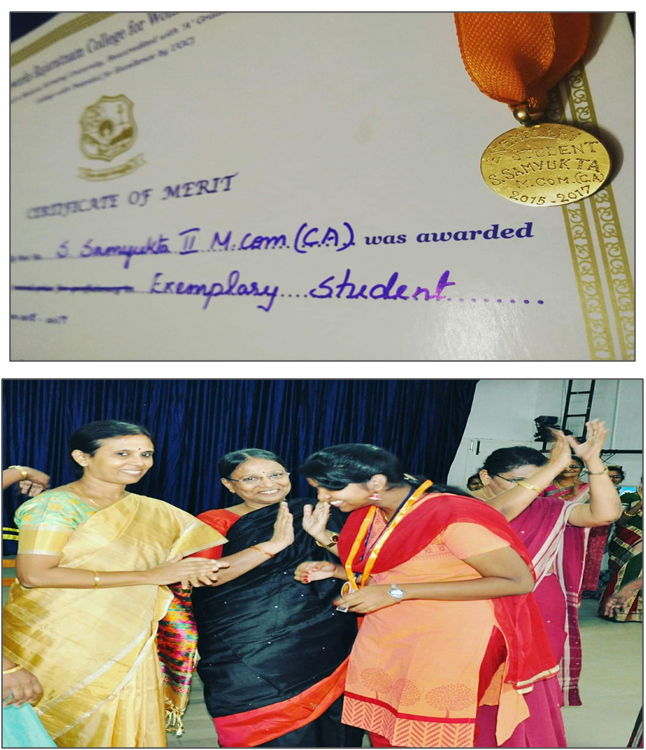
BEST PAPER AWARD – RECEIVED CASH PRIZE OF Rs . 500
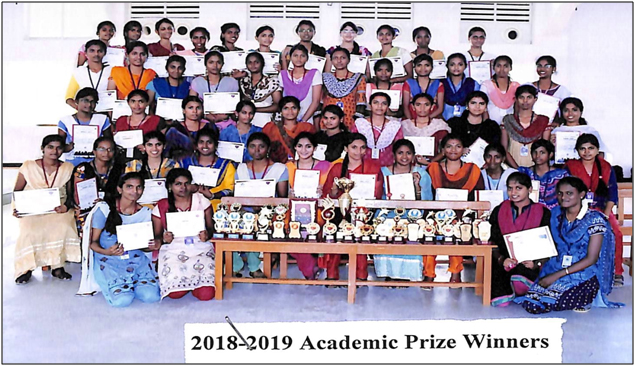
ACADEMIC PRIZE WINNERS
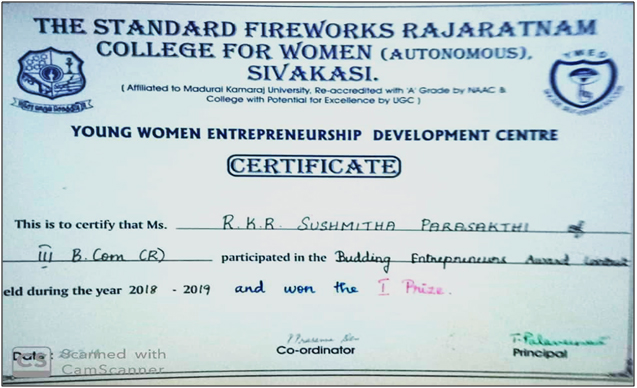
.
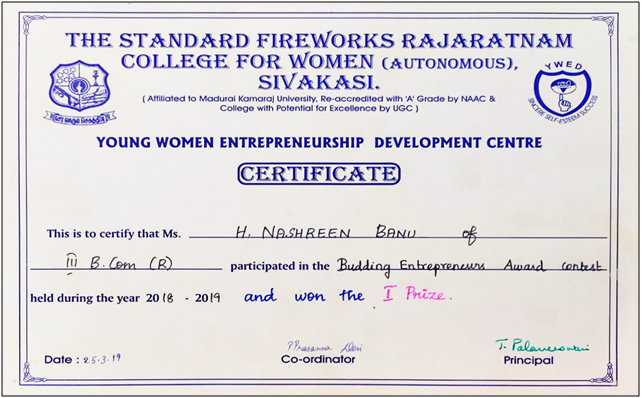
.
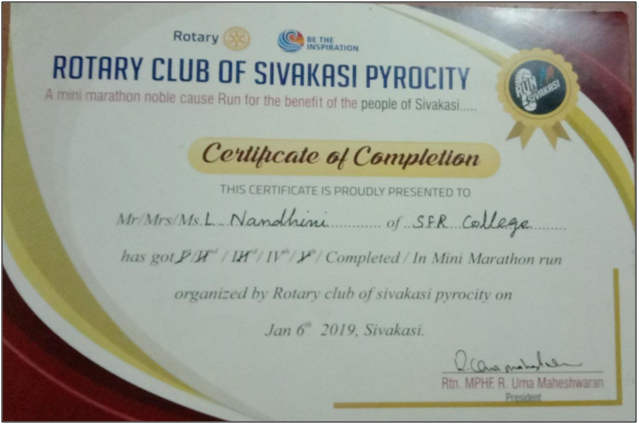
MINI MARATHON
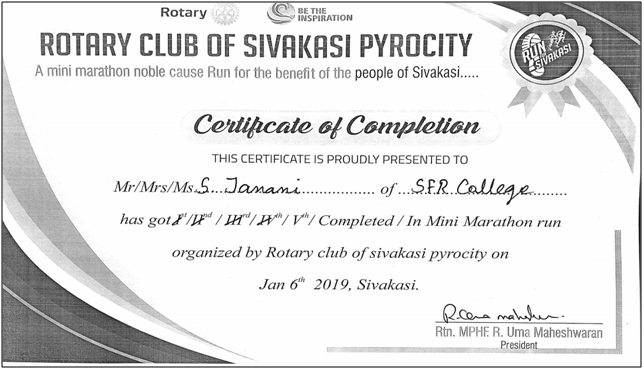
BUDDING ENTREPRENEURS AWARD
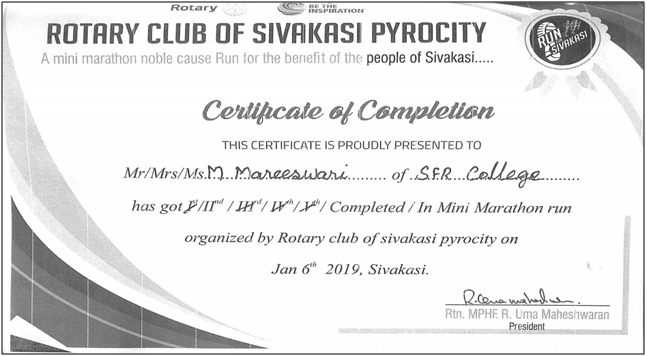
MINI MARATHON
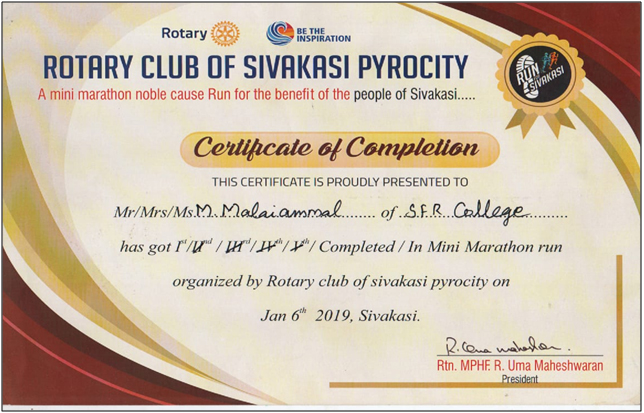
MINI MARATHON
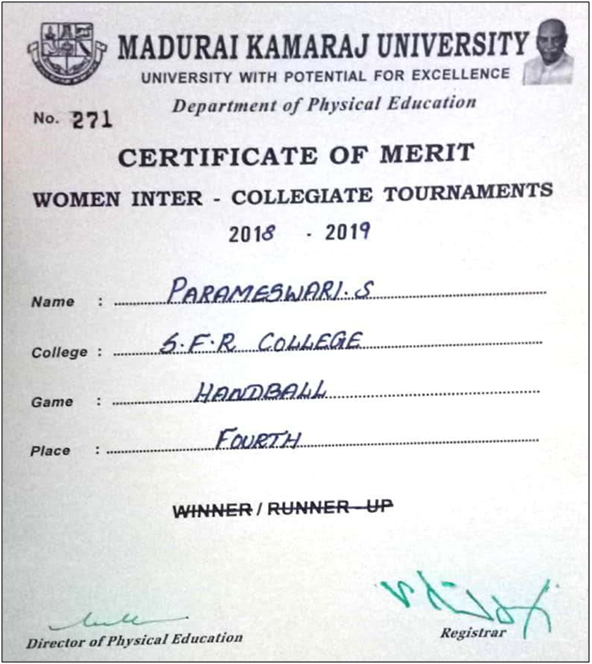
WOMEN INTER - COLLEGIATE TOURNAMENT – IV PLACE
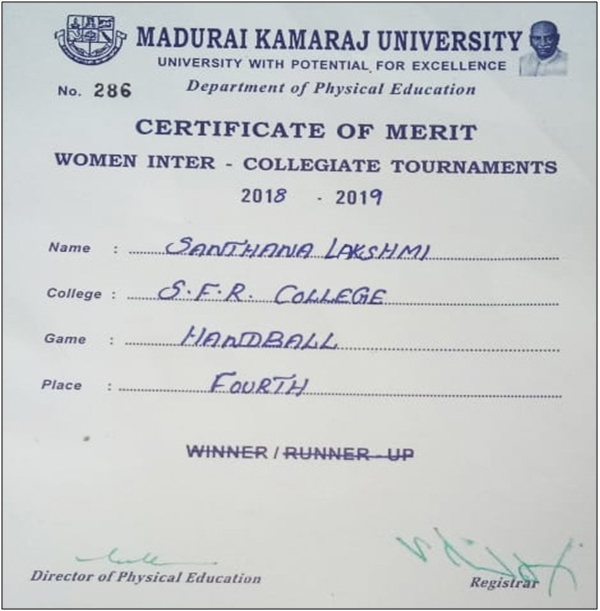
WOMEN INTER - COLLEGIATE TOURNAMENT – IV PLACE
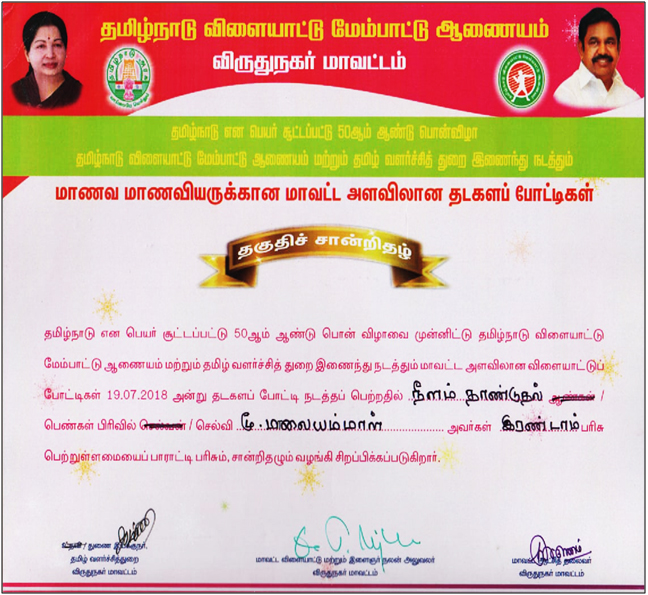
LONG JUMP FOR WOMEN - II PRIZE & CASH AWARD
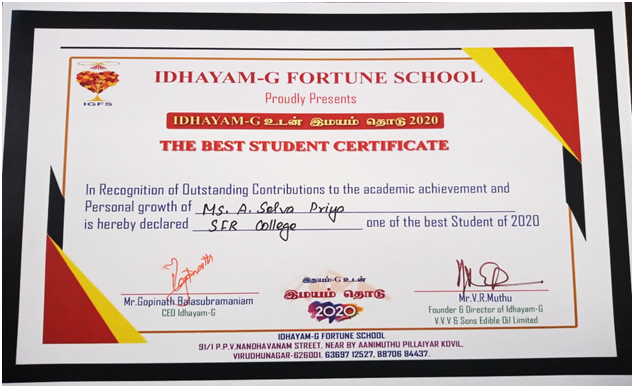
A.Selva Priya III B.Com (Gen) R- BEST STUDENT AWARD.
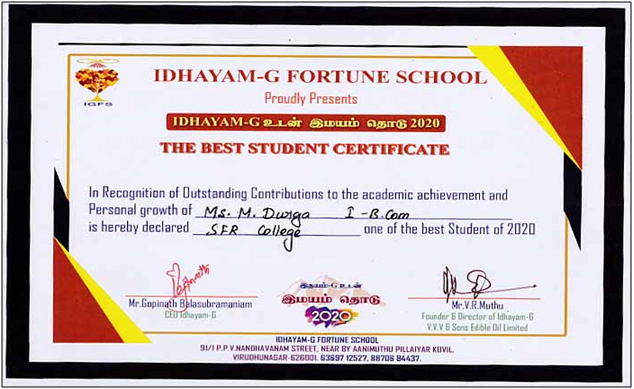
M. Durga, I B.Com (CA) R-BEST STUDENT AWARD
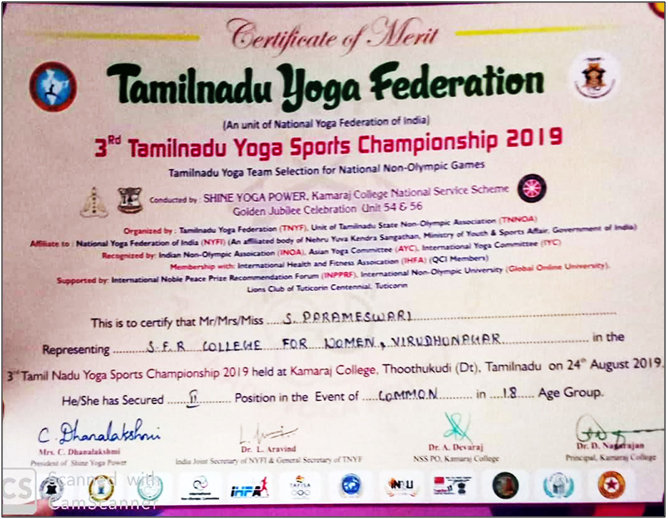
S. Parameswari - II B.COM R has secured II Position in 3rdTamilnadu Yoga Sports Championship 2019.
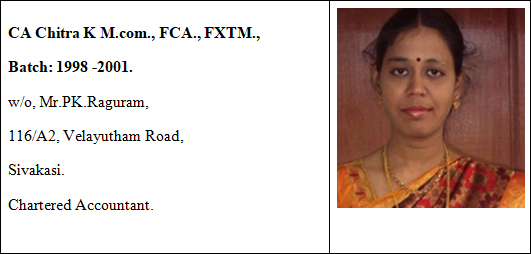
.
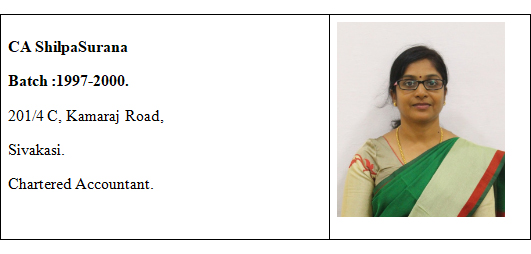
.
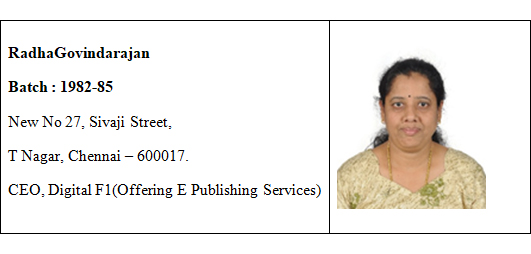
.
Contact Us
Thiruthangal Road , Sivakasi - 626123 , Tamil Nadu , India
Telephone Number
+91 4562-220389 FAX Number
+91 4562-226695 Email ID
sfrc@sfrcollege.edu.in
